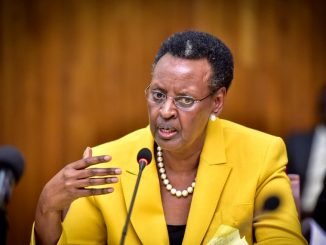
Kampala, Uganda | By Michael Wandati | Uncertainty looms for the inaugural cohort of the new lower secondary curriculum in Uganda as the government fails to synchronize the transition to the competency-based A’level curriculum.
Deputy Speaker of Parliament Thomas Tayebwa and fellow MPs express disappointment as current senior four students, initially expected to advance to A’level with the new curriculum, are now set to revert to the old system after their national exams in November this year.
The unexpected shift from the original plan in 2020 has sparked controversy, raising concerns among students, schools, parents, and the government.
The competency-based curriculum, introduced in 2020 for O’level students, emphasizes vocational skills over exam results, replacing traditional assessments with integrated activities.
It encourages collaborative projects, shifting focus from individualism and academic competition. Dr. Joyce Moriku Kaduccu, the state minister for Primary Education, acknowledges that the A’level competency-based curriculum is still in progress.
She reports ongoing activities, including an assessment study on the current A’level curriculum, consultations with stakeholders, and initiatives by the National Curriculum Development Centre to ensure continued enhanced teaching methods. The delay raises challenges for the future of education in Uganda.
“NCDC has developed A’level curriculum framework as part of an outcome-based education reform design which is aligned to the O’level framework. In addition to documents to guide the implementation, the ministry through NCDC has developed syllabus materials for the proposed 25 subjects to be offered at A’level,” she said.
Kaduccu informs that the Ministry is currently undergoing a quality assurance and approval process for the A’level curriculum, slated for presentation to parliament later.
Deputy Speaker Thomas Tayebwa expresses dissatisfaction with the slow progress of the A’level education review. He raises concerns about the impact on S.3 and S.4 learners, questioning how they can make informed A’level elective choices without clarity on the new curriculum’s structure.
Tayebwa highlights the importance of students’ aspirations being influenced by uncertain information on the A’level structure, emphasizing the need for swift resolution.
Kaduccu discloses to the house that current S.4 learners won’t shift to the competency-based curriculum in the coming year for upper secondary, as it won’t be prepared by then. This indicates their continuation of studies under the existing A’level curriculum.
“It is very clear that we’re not transiting from the new lower secondary competence-based curriculum to a new competence-based upper secondary curriculum. We’re moving from this very curriculum which is competence-based to the continuous curriculum of A’level,” said Kaducu.
This statement further confused members, and the speaker expressed concern about how learners who have been following the new lower curriculum will integrate into the existing A-level curriculum which serves totally different objectives.
“You have not answered it at all, the steps you have taken so far cannot address it because this is the time when my son is already in S.4, I expect to be knowing the combination he’s going to take. So now are there combinations?
That is why honourable Harold said some schools are telling them that choose based on the current curriculum for A’level but when you read the steps that so far you have taken, you can see that you still have a long way to go for these learners to be able to catch up with the new curriculum if you’re still at the stakeholder engagement level, meeting so and so, what are we going to do,” said Tayebwa.
In response, Kaducu requested for more time to make further consultations so she could come back next week with comprehensive details regarding the matter of transition.
“I have put in a statement that a lot of work has been done as far as the new competence-based A’level curriculum is concerned, that is in the process. My statement is very clear. Mr speaker, I wish to implore you if you could allow, let me go back and consult government on this specific and then next week I could come back with conclusive information,” added Kaducu.
Nakut Faith Loru, Napak Woman MP proposed that the pioneer students of new curriculum be exempted from A’level and just be given certificates to join the university and other higher institutions of learning.
“Our children who are in this experimental stage of the new curriculum be exempted from A’level. Yes, there are many countries that do not do A’level and their children go to the university. It is not in the interest of our children that they be experiments. It was not their choice that they be born late or be born to young parents. But for you your children are already graduates, you no longer care about those children of other people or because your children study international curriculum, you don’t care about the rest of us. You make these children go through all hell just because you’re experimenting.”
Jonathan Odur, MP for Erute South criticized the ministry, saying that there was a lack of thorough debate and discussion on the competence-based curriculum when it was passed back in 2019. He said if stakeholders had been given the opportunity to raise concerns, some of the issues emerging now could have been foreseen and addressed in a timely manner.
“I want to appeal to government that when you have policies that are well-intentioned in the country, you should not hide it from the stakeholders because they are our children and these are the children we expect to to take the mantle from us.
So we have actually put the cart before the horse and that is why we’re meeting these challenges. Even on the aspect of financing alone the ministry is grappling with financing to implement a programme they initiated themselves and you ask yourself is government thinking in reverse that you bring a good programme and you cannot finance it,” said Odur.
UCE 2023
Meanwhile, Kaduccu reveals that last year’s learners under the old curriculum who failed exams will have a one-off chance to resit, presenting this proposal to parliament.
The exams, targeting 2023 UCE participants, include those who registered but didn’t sit, those who missed registration, and independent adult learners.
The initiative responds to the annual average of 6,000 no-shows despite registration and aims to help those recommended to retake senior four.
However, concerns arise over the tight timeline, as Uneb hints at June and July exams, giving learners only four months to prepare.
Also Read: MPs want new UCE curriculum stopped
MPs like John Twesigye seek clarification on specific dates and processes, questioning the feasibility, while Solomon Silwany suggests a continuous rather than singular opportunity to address potential issues.
“We’re aware that there are children who will sit and will not pass even with the second time. There will be children who will maybe be sick and will not be available to sit for these exams that one time. Will they be provided another opportunity to sit again because it cannot be a one-time offer and then close out the rest of the people?,” said Silwany.



